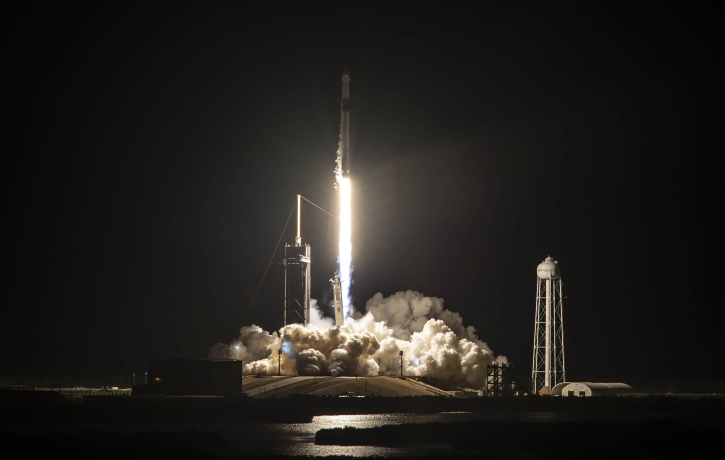From Florida, On a momentous night on March 3rd, 2024, a powerful SpaceX Falcon 9 rocket roared to life, carrying a crew of four astronauts on a historic journey to the International Space Station (ISS). This mission, designated Crew-8, marks a significant chapter in space exploration, fostering international collaboration and scientific discovery.
A Blazing Ascent
With a fiery spectacle that illuminated the Florida night sky, the Falcon 9 blasted off from NASA’s Kennedy Space Center in Cape Canaveral. This 25-story colossus, fueled by cutting-edge technology, propelled the Crew Dragon capsule, dubbed Endeavor, on its path towards the cosmos. A live feed showcased the awe-inspiring climb as the nine Merlin engines ignited, generating a breathtaking display of power and light.
A Crew of Distinction
Florida, Endeavor carried a diverse and accomplished crew on this critical mission. Leading the charge is Commander Matthew Dominick, a seasoned Navy test pilot embarking on his maiden spaceflight. Joining him is Dr. Michael Barratt, a veteran astronaut with two successful space station missions under his belt. Rounding out the team are spaceflight rookies Jeanette Epps, a brilliant aerospace engineer. Alexander Grebenkin, a former military aircraft engineer representing the Russian space agency Roscosmos.
A Testament to Collaboration
The inclusion of a Russian cosmonaut signifies a continued commitment to international collaboration in space exploration, even amidst geopolitical tensions. This partnership builds upon the legacy of the ISS, a symbol of unity forged during the Cold War era. This collaborative spirit extends even further, with the space station itself being a multinational marvel involving the United States, Russia, Canada, Japan, and eleven European nations.
A Beacon of Scientific Progress
Crew-8 will spend a productive six months aboard the ISS, conducting a multitude of groundbreaking scientific experiments. The microgravity environment of the orbiting laboratory provides an unparalleled platform for research. Fostering advancements in fields like medicine, materials science, and space exploration technologies.
Imagine the possibilities
- Medical breakthroughs Studying the effects of microgravity on human physiology could lead to advancements in bone health, cardiovascular function, and wound healing, benefiting both astronauts and Earth-bound patients.
- Material marvels Experiments on material behavior in space could pave the way for the development of stronger, lighter, and more efficient materials for future spacecraft and even everyday applications.
- Spacefaring strides Testing new technologies and procedures onboard the ISS helps pave the way for long-duration deep space missions. Bringing us closer to the dream of exploring Mars and beyond.
A Legacy of Inspiration
This mission not only pushes the boundaries of human knowledge but also serves as an inspiration for future generations. As Crew-8 delves into the mysteries of space, their work paves the way for a brighter future. Driven by scientific curiosity and international cooperation. Young minds watching from Earth can dream of becoming the next generation of astronauts, scientists. Engineers who will push the frontiers of human exploration. The liftoff of Crew-8 is not just a launch it’s a catalyst for progress and a reminder that humanity, when united by a common goal, can achieve incredible things.






